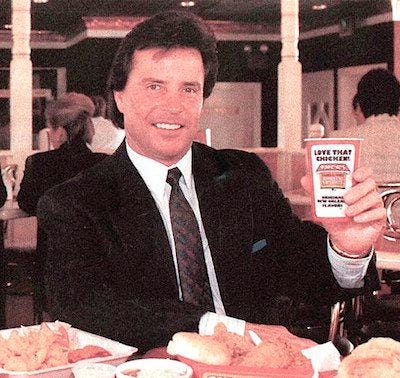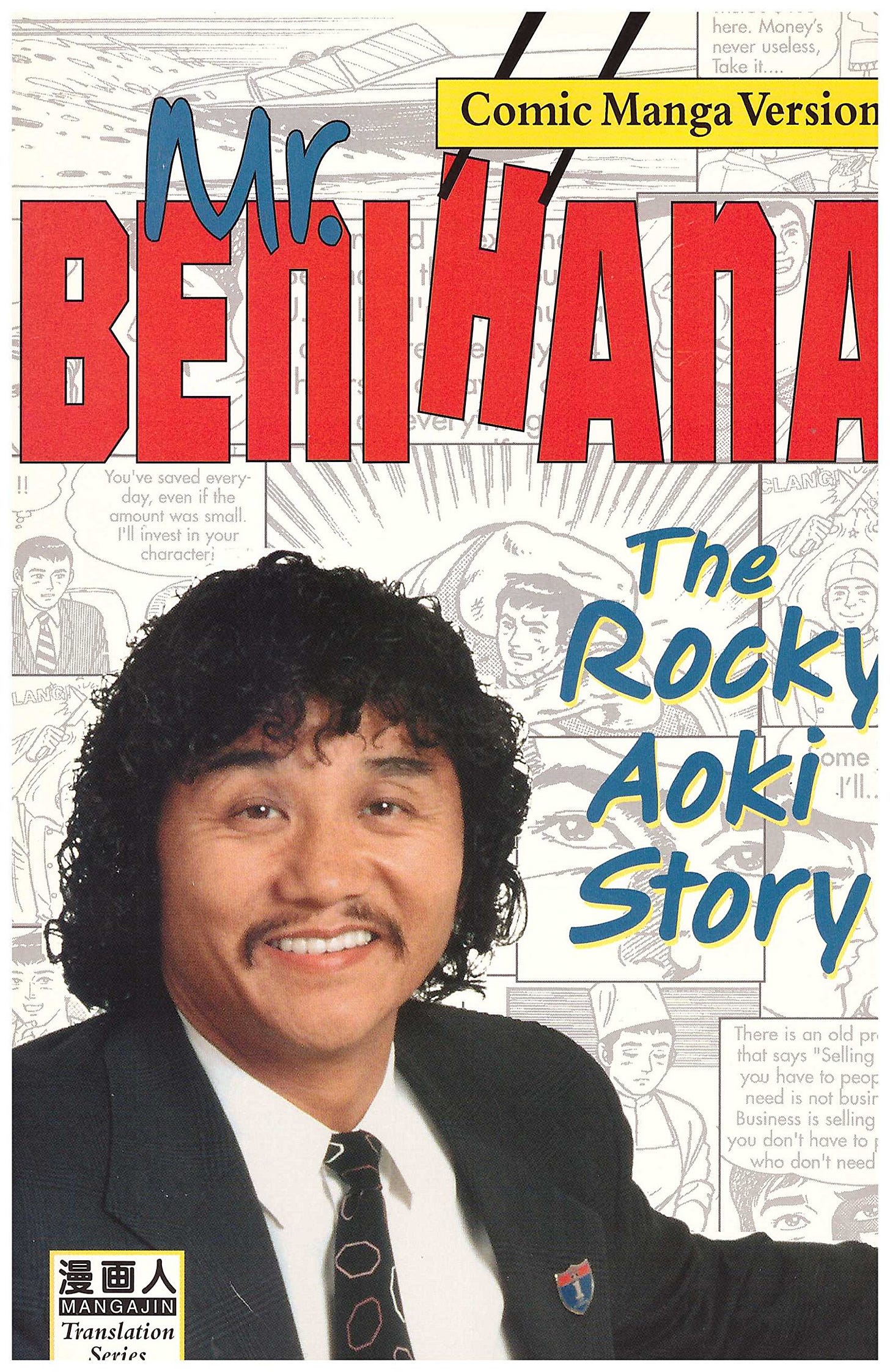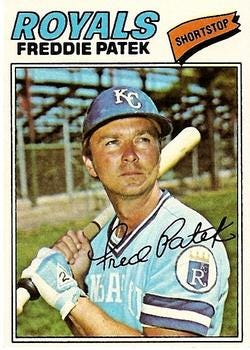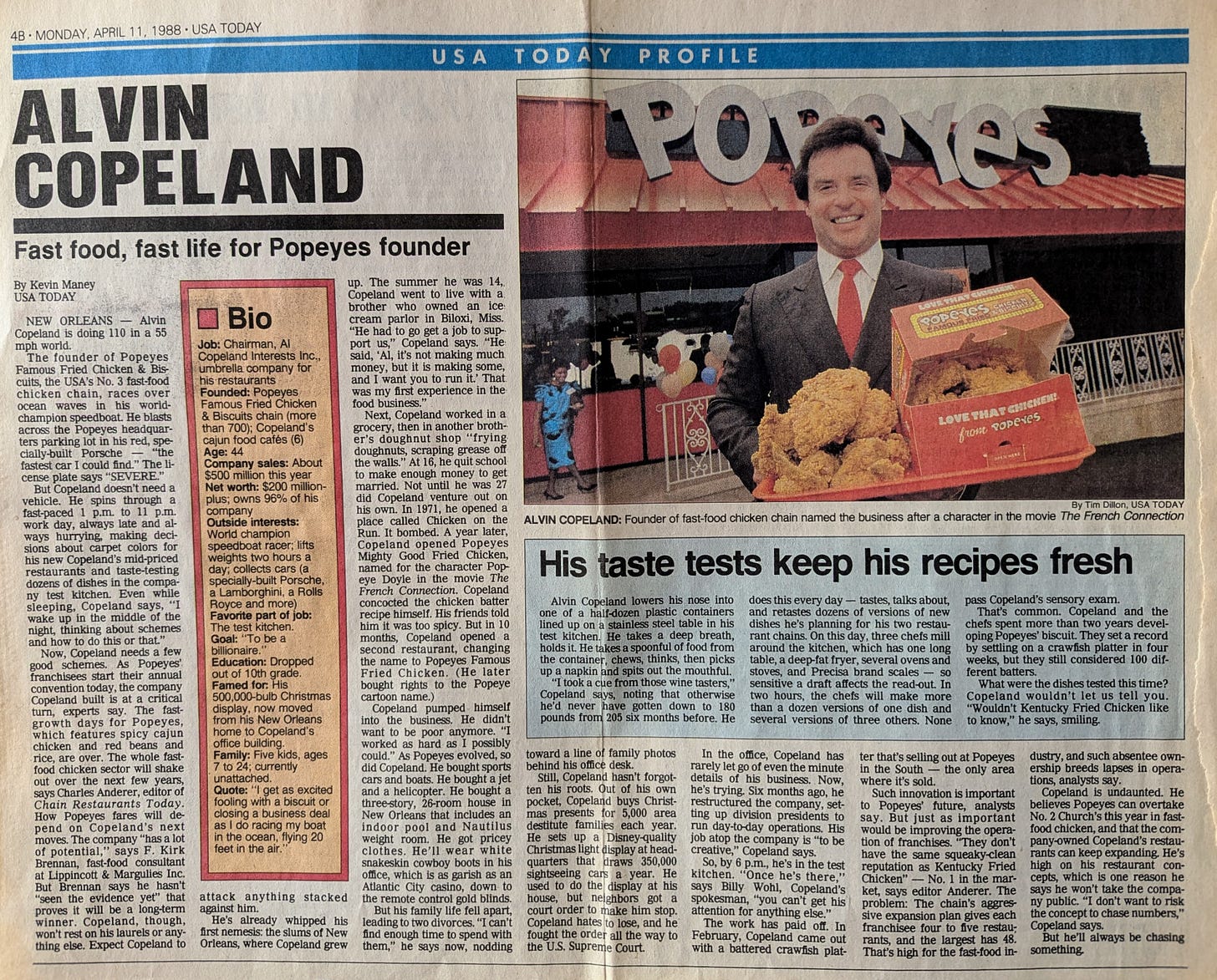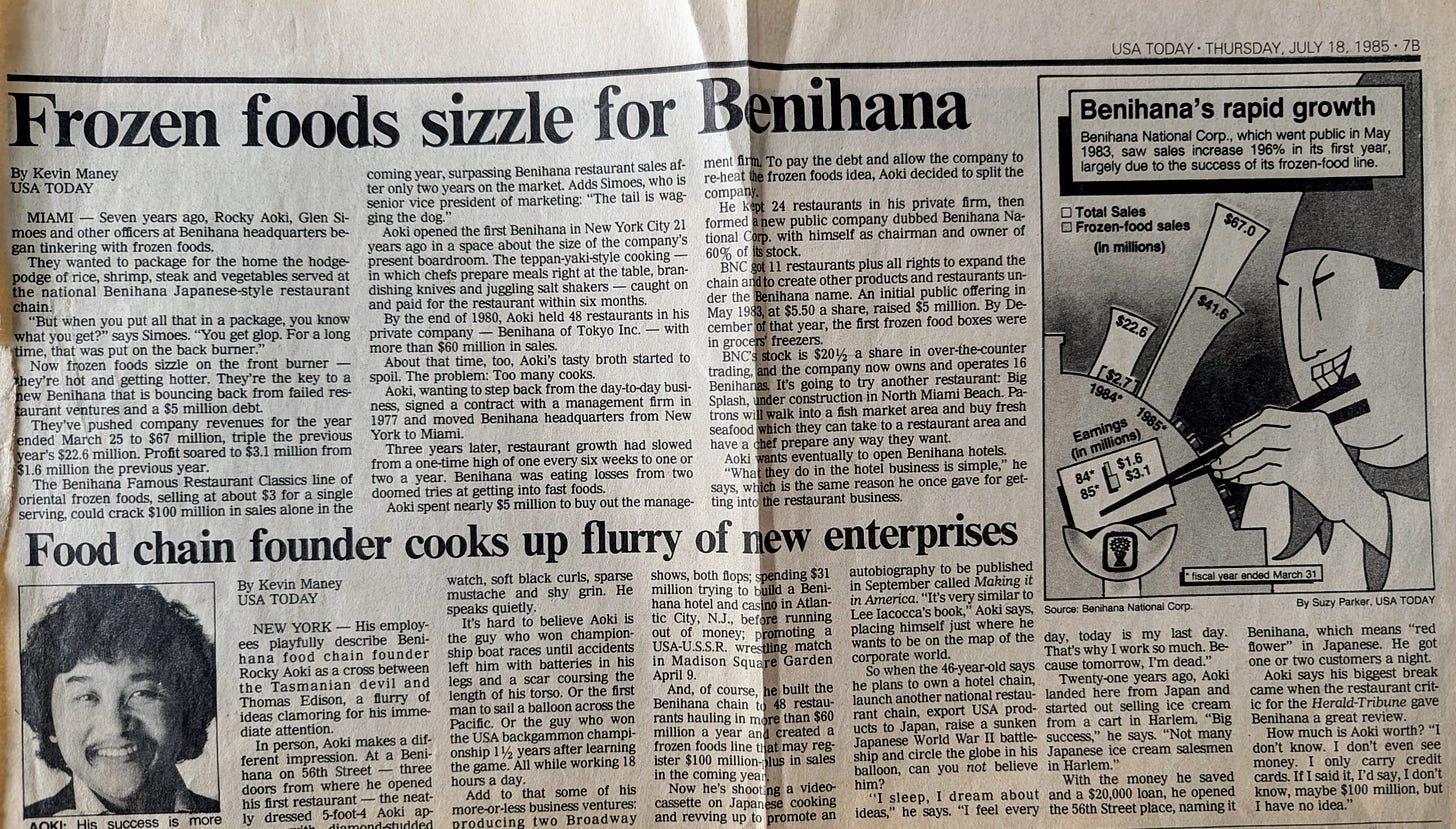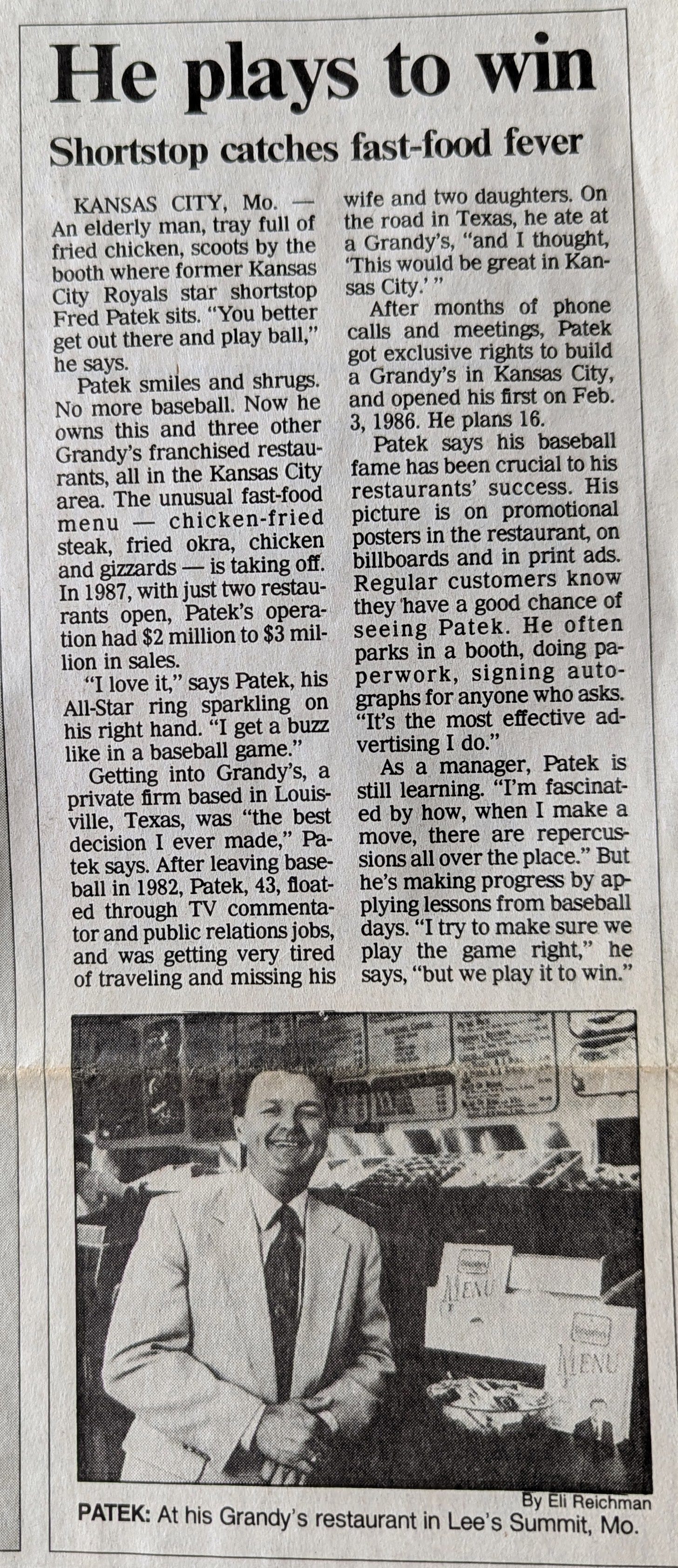The Odd '80s Restaurant Magnates and Me
Alvin Copeland's Popeyes, Rocky Aoki's Benihana and Freddie Patek's Grandy's
Looking back at my clips from USA Today, apparently in the late 1980s I specialized in writing about odd chain restaurant magnates.
In the span of a few years, I met and interviewed Alvin Copeland, who started fried chicken chain Popeyes; Rocky Aoki, creator of Benihana; and Freddie Patek, the one-time star shortstop for the Kansas City Royals who owned a bunch of restaurants called Grandy’s Country Cookin’. Until I looked it up, I had no idea Grandy’s still existed, but it operates 23 restaurants across six states.
These stories were in addition to my profile of Tom Carvel, which I wrote about previously.
Copeland and Aoki, who both died in 2008, were certifiably weird. Patek was a lovely guy when I met him. He’s alive and now 79.
In the spring of 1988, I traveled to New Orleans to interview Copeland at Popeyes headquarters. Popeyes was having a moment, growing like mad (700 stores at the time, now 3,700-plus!), and scaring Kentucky Fried Chicken (which hadn’t yet changed its name to KFC so it could ditch the “fried” label). I remember sitting across from Copeland as he responded to my questions from behind his desk and thinking it was like interviewing a tornado – his words came at me fast and full of bluster.
Copeland then was 44. He dressed in expensive suits, had a perfect coif out of the Trump School of Eighties Hair, and owned a red Porsche with a license plate that said, SEVERE. Should tell you something. He also owned a Lamborghini and raced speedboats. I followed him around the Popeyes test kitchen at one point as he chewed prototype items and spit them out. “I learned something from those wine tasters,” he told me, noting that it was the only way he got down to 180 pounds from 205 in the previous six months.
Copeland was a good story. He grew up poor in New Orleans and never finished high school – which is why, as it was easy to see, he tried so hard to look rich and smart by the time I met him. As a teen, he worked at a brother’s donut shop, where he learned about the food business. In his twenties, he started one chicken place that flopped, then a year later opened the first Popeyes, basing it on the Louisiana staples he grew up with – chicken, rice and red beans, and biscuits. He named the restaurant Popeyes not after the cartoon character, but after a character in the movie “The French Connection.” A year after that, Copeland opened a second one and then kept going.
Copeland, though, ran into rough times soon after my visit. Popeyes in 1989 took on a pile of debt to buy rival Church’s, and then in 1990 defaulted on the loans and filed for bankruptcy. Creditors took over and booted Copeland. Now the company is owned by Restaurant Brands International. Soon after all of that, Copeland wound up in a public feud with horror novelist Anne Rice because she placed a full-page ad calling a new restaurant Copeland opened “nothing short of an abomination.” In 2007, Copeland was diagnosed with a rare cancer, and he died in 2008 at 64. Popeyes lives on and in 2019 launched what became known as The Chicken Sandwich Wars, which gave Popeyes the more publicity than it had gotten in decades.
Aoki was a 5-foot-4 Japanese version of Copeland. Same crazy energy. “I sleep, I dream about ideas,” he told me. “I feel every day is my last day. That’s why I work so much. Because tomorrow, I’m dead.” He had the same tendency toward flash, too: tailored suits and, when I met him, a diamond-studded watch. He owned fast cars and like Copeland raced speedboats.
Aoki landed in New York from Japan in 1960 and sold ice cream from a cart in Harlem to get by. Three years later, he opened a four-table restaurant on 56th Street in New York, naming it Benihana after a flower that grew in Japan. By the time I talked to him, he had 48 Benihana restaurants and had gone public in 1983. He’d also won championship boat races, had horrific speedboat accidents, crossed the Pacific in a hot-air balloon and won the USA backgammon championship.
And, like Copeland, Aoki got into trouble. In 1999 he pleaded guilty to insider trading charges and was nearly deported. In the 2000s he ended up suing four of his children for allegedly trying to take control of the companies he founded. His death in 2008 was supposedly from complications from a hellacious speedboat crash almost three decades earlier. Now Benihana is owned by One Group Hospitality and operates 68 restaurants.
Finally, there is Fred Patek. I grew up watching him play for the Kansas City Royals in the 1970s. I was a fan of that superstar team, which included George Brett and Amos Otis. Patek was one of the stars, and specialized in stealing bases. He was, like Aoki, small – at 5-foot-5, the shortest player in baseball at the time. In his rookie season in 1968, Patek reportedly had an exchange with a newspaperman who asked Patek: “How does it feel to be the smallest player in the majors?” Patek replied: “A heck of a lot better than being the tallest player in the minors.”
I met Patek in 1988, seven years after he’d retired. We sat and talked at a booth in a Grandy’s in Kansas City, and he was gracious as patrons came up to him to chat, ask for autographs, or to tell him he should get back out there because the Royals needed him. The only thing flashy about him was his All-Star ring.
Patek told me that after he retired, he tried being a baseball commentator and doing TV commercials, but didn’t like the constant travel. He had wandered into a Grandy’s in Texas and liked the Southern cooking concept – the menu included chicken-fried steak (which I tried and it is delicious but it’s just breaded and fried steak, a classic “heart attack on a plate”), fried okra and chicken gizzards (I did NOT try the gizzards). Patek bought rights to open Grandy’s in Kansas City and owned four when I interviewed him. “I love it,” Patek said about running the restaurants. “I get a buzz like in a baseball game.”
Actually, I doubt that was true. Managing a restaurant chain or playing shortstop for an MLB team…which would give you a bigger adrenaline rush?
Anyway, Patek seems to have avoided controversy. Grandy’s as a whole went through a series of ups and downs and acquisitions and has been owned by restaurant holding company Captain D’s since 2011. Patek moved back to Oklahoma City, where he was born. He remains the second shortest player in MLB history, behind Wee Willie Keeler, who retired in 1910.
—
These are the stories as they appeared in USA Today in the late-1980s. They are not available online.


